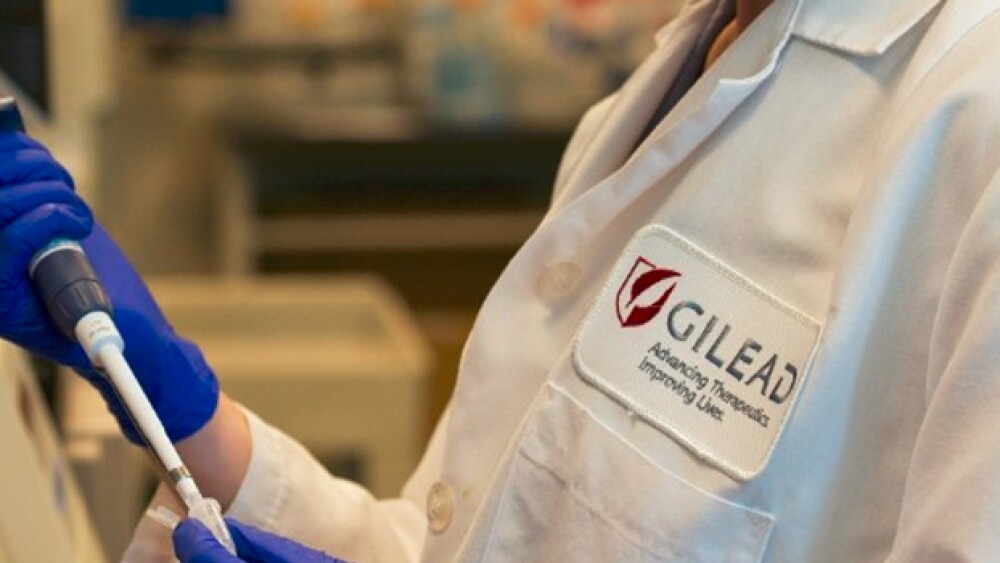Gilead Sciences announced that its selonsertib to treat compensated cirrhosis from nonalcoholic steatohepatitis (NASH) did not meet its primary endpoint in the STELLAR-4 Phase III trial. Given Gilead’s expertise in liver diseases, the setback is particularly discouraging.
Gilead Sciences announced that its selonsertib to treat compensated cirrhosis from nonalcoholic steatohepatitis (NASH) did not meet its primary endpoint in the STELLAR-4 Phase III trial.
NASH is a progressive fatty liver disease similar to cirrhosis, but in patients who drink little or no alcohol. It is related to the obesity epidemic. There are currently no specific treatments except for lifestyle changes—diet, weight loss and exercise. The market for NASH treatments is projected to hit $20 billion to $35 billion.
Selonsertib is a once-daily, oral inhibitor of apoptosis signal-regulating kinase (ASK1). The trial enrolled 877 patients. In the trial, 14.4 percent of patients receiving selonsertib 18 mg and 12.5 percent receiving 6 mg doses had a ³1-stage improvement in fibrosis without NASH growing worse after 48 weeks of treatment. This compared to 12.8 percent in the placebo group. The drug was generally well-tolerated.
“While we are disappointed that the STELLAR-4 study did not achieve its primary endpoint, we remain committed to advancing therapies for patients with advanced fibrosis due to NASH, where there is a significant unmet need for effective and well-tolerated treatments,” stated John McHutchison, Gilead’s chief scientific officer and head of Research and Development.
He went on to say, “Data from this large study of patients with compensated cirrhosis due to NASH, including the extensive set of biomarkers collected, will further advance our understanding of the disease and inform our broader NASH development programs. We are grateful to the patients and investigators who participated in the STELLAR-4 study, and we now await the upcoming results from the Phase III STELLAR-3 trial of selonsertib in patients with bridging fibrosis due to NASH and the Phase III ATLAS combination trial of selonsertib, cilofexor (GS-9674) and firsocostat (GS-0976) in patients with advanced fibrosis due to NASH later this year.”
Given Gilead’s expertise in liver diseases, the setback is particularly discouraging. The company is still the dominant player in the hepatitis C market (HCV), but their success has been their downfall. Their HCV drugs are so successful they have essentially cured the disease, creating a smaller and smaller patient pool to draw on.
The company’s recent 2018 fourth-quarter and year-end financial report told the story. Total revenues for 2018 were $22.127 billion, down from $26.107 billion in 2017. HIV product sales were up from $3.4 billion in the fourth quarter 2017 to $4.1 billion in the fourth quarter 2018, but HCV product sales were $738 million for the 2018 fourth quarter down by about half form $1.5 billion in the fourth quarter the previous years. HCV sales for 2018 were $3.7 billion compared to $9.1 billion in 2017.
The company has put a lot of money and energy into bolstering its efforts in the NASH arena. On Jan. 7, 2019, it acquired global rights to develop and commercialize novel small molecules against two targets from South Korea’s Yuhan Corporation. Both drugs will be developed to treat advanced fibrosis related to NASH.
In Dec. 2018, Gilead signed a strategic collaboration deal with Cambridge, Mass.-based Scholar Rock to discover and develop highly specific inhibitors of transforming growth factor-beta activation for fibrotic diseases, including NASH. Gilead paid Scholar Rock $80 million up front, made up of $50 million in cash and the acquisition of $30 million in common stock. Scholar Rock is eligible for up to $1.425 billion in potential payments across all three programs in addition to high single-digit to low-double-digit tiered royalties on future product sales.
Because NASH is considered a multifactorial disease including fibrosis, inflammation and metabolism, Gilead and many other companies working in the field are approaching it with combination therapies, each of which focuses on a specific aspect of the disease.





